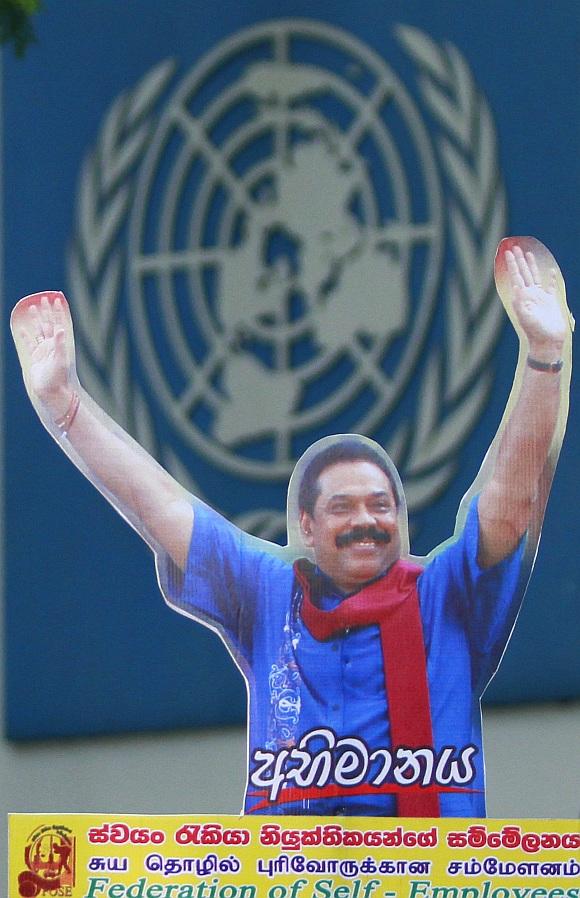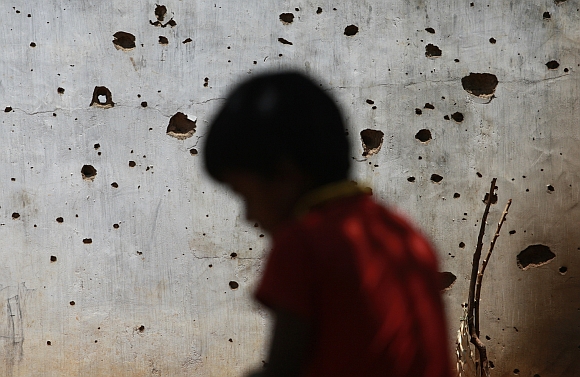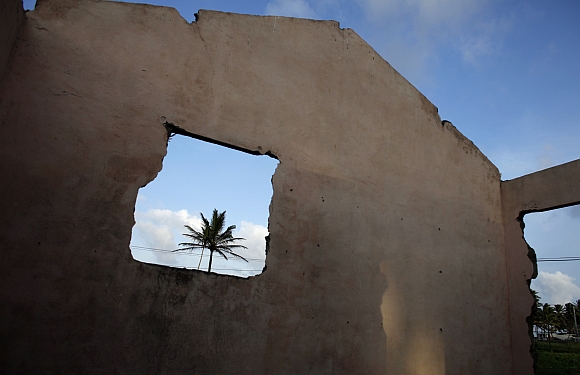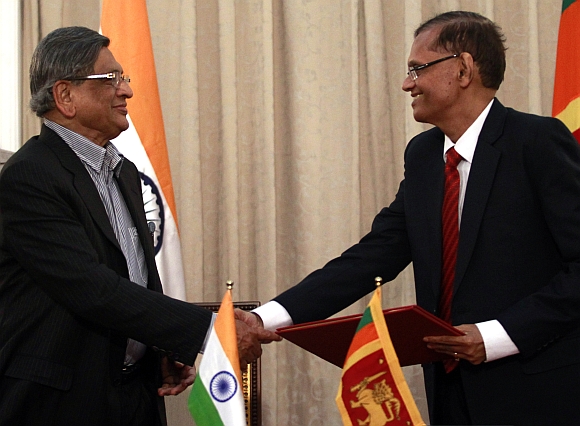
This is a question that is being debated not only in the UN Human Rights Council meeting at Geneva or Sri Lanka, but in India as well. This came about, typically the way Parliament responds to issues these days, after members from Tamil Nadu stalled the crucial pre-budget parliamentary session, says Colonel R Hariharan
Clearly Indian government is trying to find its famous "middle path" to make up its mind. And 'middle path' as per its standard operative procedure is to buy time. So we see the hapless minister, facing the flak from the media and other political parties, indulging in word play rather than answering question squarely.
Allegations of Sri Lanka's war crimes which are now firmed up in public mind -- both at home and abroad --cannot be wished away by anyone. Regardless of the veracity of Channel 4 videos or reports of holier-than-thou human rights activists or orchestrated propaganda by pro-Eelam separatists, the issue now stands on the magnitude of the allegations.
They require serious investigation by Sri Lanka and the country has failed to do this even after nearly three years of peace. If past experience is any guide, Sri Lanka may never do better than what it is doing now. It is going by the letter rather than spirit of national and international obligations to the people and the world.
What are Sri Lanka's fears if it accepts to recognise the issues raised by the resolution and promises to act on a time bound schedule?
Is the United States resolution a threat to Sri Lanka's sovereignty of nations? Absolute hog wash. The US resolution has nothing to do with sovereignty. Nor is it going to trigger international action as a follow up if Sri Lanka adroitly manoeuvres the semantics of the resolution (countries do it all the time in United Nations).
In fact, only if the issue hangs fire, Sri Lanka will continue to walk the lobbies of UN and Geneva. The simple truth is Sri Lanka does not appear to want the key concerns raised to be even discussed not only in international forums but also nationally. Its propaganda machines are working overtime to give it a strong, emotive colouring, as a threat to the nation's dignity and self respect.
The US statement explaining how it worked carefully before drafting the resolution shows it came as no surprise as Sri Lanka was provided every opportunity to salvage the situation. One of the objectives of the US draft resolution appears to be to leave the issue to Sri Lanka to resolve with some face saving action.
...

That is why the US resolution has been watered down (the US style of the "middle path"), to soften its impact on Sri Lanka. And the resolution is symbolic (rather than diabolic), and merely draws attention to Sri Lanka's poor accountability.
So even if Sri Lanka accepts the essence of resolution, it is doubtful whether its action stations would work overtime to get at the truth. But Sri Lanka does not want even to do this, because it wants the issues to be buried.
And that would be sad not only for the Tamils but Sinhalas as well, who have been victims of gross human rights violations, before, during, and after the war. Justice needs to be done to them because for too long Sri Lanka had been wishing away its aberrations; a huge number of people have vanished at times unwept.
Of course, no one can deny the Liberation Tigers of Tamil Eelam had the dubious credit for many of these killings. But the state, which is not a terrorist body, but an elected government has not fared any better.
It carries a huge baggage of guilt accrued during not only counter insurgency operations against Tamils but during its anti-JVP operations, and for unaccounted disappearances and killings of those demurred. And this baggage has been collected not only during President Rajapaksa's dispensation but during earlier regimes as well.
So time has come for Sri Lankans everywhere to call upon their government to be more accountable. And a resolution at the UNHRC may well be a wakeup call to them.
While this explains the context of the resolution, does India's decision dependent upon it? I doubt. Nations handle issues at international forums on many other considerations; so a few other questions on a broader context may help clear the grey areas.
Does India want Sri Lanka to carry on as before, ignoring or disowning promises its head of state had made to India on the very same issues in the past with?
If not, India should vote for the resolution because not voting would indicate that Sri Lanka can take India for granted. It would only indicate India's influence with Sri Lanka is all words with no substance. And it would reinforce the growing belief that Sri Lanka would go back on any promise it makes to India.
...

Because India can be in Sri Lanka within 40 minutes of commercial flight or three hours journey by boat. And China will always be physically farther than India; China knows this. The strategic lessons from India's almost real time response to provide succour to Sri Lanka when Tsunami caused havoc, would not be lost on China.
A second aspect is regardless of India's stand on this issue, China will continue to make further forays into Sri Lanka. It is part of its ambitious global vision. And Sri Lanka is geo-strategically too important for China to ignore in the Indian Ocean Region.
It is for these reasons that India should send a strong message to Sri Lanka by voting for the resolution, lest ignoring Indian concerns becomes a habit.
Lastly, time has come for the Indian government to show it is guided by a value system, rather than Machiavellian backroom manoeuvres. I am one of those who believe human rights consciousness is coming of age in this country, despite a number of aberrations that continue to be committed.
People want the government to be more accountable than ever before for such aberrations. And despite a lot of cynicism, the state machinery has taken a number of measures to improve its performance.
Despite political machinations, a structural mechanism is in place to question human rights violators. If India does not vote for the U.S. resolution, it would put the clock back on the nation's long quest for accountability and better human rights performance.
...

Allegations on human rights abuses are on many occasions brought to settle scores by nations (to this extent Sri Lanka is correct; but the issued has passed that stage in the case in point). So some argue India would not vote for the resolution in its own interest. It could set a precedent for others to put India on the dock for its human rights violations.
This is far from the reality; nations are brought before international forums on human rights issues as a last resort. And India is neither North Korea nor Myanmar to feel diffident about its record; it has been striving to improve its human rights. So if accusations are made it should face them squarely and confidently.
Moreover, India cannot prevent such allegations coming up in the future by shying away from the issues.
Even after all these arguments, I wish I can confidently say India would vote for the US resolution.
Dr Manmohan Singh's coalition government is doing tight rope walking to survive another day thanks to the theatrics of its coalition partners. But the Tamil parliamentarians protest in parliament may not turn out an acid test for survival of his government.
The same Tamil members, who brought Parliament to a halt, never took a single step to save the peace process 2002 from collapsing nor made a concerted effort after war to dispassionately understand the problems of Tamils in Sri Lanka (not Diaspora Tamils) and help them.
Their actions are mostly for political reasons and not for improving the value systems. This is in keeping with the characteristic of our parliamentarians. They had little time in the past to deliberate upon human rights aberrations unless it had "vote-bank" considerations.
But people are different; they are watching what their politicians do. Indians everywhere feel that time has come for the country to stand up confidently and say it stands by a value system cherished by its founding fathers. And the US resolution before the UNHRC could well be the litmus test to show it.
That is why India should vote for the resolution. If it is working to modify the resolution, it must have the confidence to say what it would like to modify. Otherwise, India would be taking a step backward. And that would be a pity.
(Col. R Hariharan, a retired Military Intelligence officer, is associated with the South Asia Analysis Group and the Chennai Centre for China Studies)